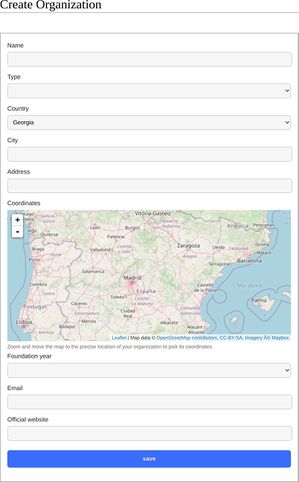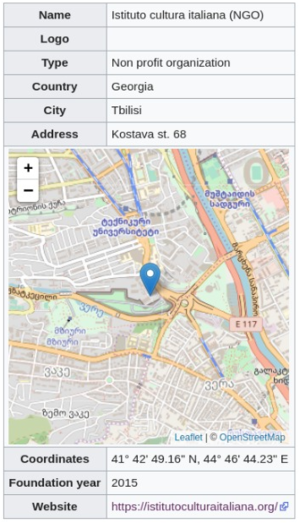Main Page
| Line 24: | Line 24: | ||
Usually you do that with a concealed database, with an arbitrary data-structure in which the aspects of interoperability, accessibility, and cooperativeness are reduced to zero, and therefore which limit the use of your data to the original platform, which is typically "isolated" on the web: furthermore, information stored therein are not readable, as such, from third party systems, through an universal vocabulary which is indeed the aim of [https://www.wikidata.org/wiki/Wikidata:Main_Page wikidata], a project to which our is strictly related and where a [https://www.mediawiki.org/wiki/Wikibase wikibase repository] is already installed and ready to use at [https://data.culturaitaliana.org/wiki/Culturaitaliana-data:Main_Page this address], thus we are currently relying on [https://www.semantic-mediawiki.org/wiki/Semantic_MediaWiki semantic mediawiki], because the [https://www.wikidata.org/wiki/Wikidata:Federation_input federation] feature of wikidata/wikibase at the year (2020) is not yet ready, and nonetheless we can do the steps in that direction all together. | Usually you do that with a concealed database, with an arbitrary data-structure in which the aspects of interoperability, accessibility, and cooperativeness are reduced to zero, and therefore which limit the use of your data to the original platform, which is typically "isolated" on the web: furthermore, information stored therein are not readable, as such, from third party systems, through an universal vocabulary which is indeed the aim of [https://www.wikidata.org/wiki/Wikidata:Main_Page wikidata], a project to which our is strictly related and where a [https://www.mediawiki.org/wiki/Wikibase wikibase repository] is already installed and ready to use at [https://data.culturaitaliana.org/wiki/Culturaitaliana-data:Main_Page this address], thus we are currently relying on [https://www.semantic-mediawiki.org/wiki/Semantic_MediaWiki semantic mediawiki], because the [https://www.wikidata.org/wiki/Wikidata:Federation_input federation] feature of wikidata/wikibase at the year (2020) is not yet ready, and nonetheless we can do the steps in that direction all together. | ||
| − | By contrast the data structure typically concealed on ordinary web sites and web applications, in a wiki system with semantic data can be expressed in terms of a set of properties, of which here is [https://culturaitaliana.org/w | + | By contrast the data structure typically concealed on ordinary web sites and web applications, in a wiki system with semantic data can be expressed in terms of a set of properties, of which here is [https://culturaitaliana.org/w/index.php?title=Special:Properties&limit=250&offset=0 the complete list]]: and you can suggest set of properties (corresponding indeed to a "form") representing specific set of data depending on your needs and experience, of which can take benefit (in the sense that they can shape that information which is otherwise disorderly produced) all of us! |
Here is for instance a set of properties representing an organization: | Here is for instance a set of properties representing an organization: | ||
Revision as of 19:45, 9 July 2020
Cultura italiana is a project aiming to create a network and to enhance cooperation among centers of Italian culture and language at abroad.
It is meant to be composed of at least 2 components: a back-end platform, represented by this wikimedia site, where authorized staff of centers of Italian culture and language can add or create information regarding their organizations in a collaborative way and with attention for semantic data, and by a front-end platform, represented for the moment from this site, where the published contents can be viewed, searched and enjoyed by visitors in an attractive and modern way, including the use of mobile applications.
The project is being implemented within the frame of a Solidarity Corps project (funded by European Union), is supported at the moment by the center of Italian culture and language in charge of the project which ensures its continuity over time (as well as that the requirements of the project are met) and foresees the inclusion of other institutions and organizations interested in taking part to the initiative.
With reference of the "back-end" part, we oriented ourselves to a mediawiki system, because is open-source, it offers the most or one of the most reliable systems world-wide for creation and publishing of collaborative contents (thanks to the challenge posed by a critical application like Wikipedia) with a leading version control system (it keeps track of the history of changes of every page, and is able to do comparisons between any version's article with whatever other), and because it can be actually used as a collaborative and distributed CMS (content management system) with no hidden information and, once again, completely open source, including the functionalities to represent and to handle data, like templates and forms.
The key-feature of the project is its ability to easily create semantic data out of simple forms, representing specific set of data (like articles, organizations themselves, meetings, calls & announcements, reading suggestions, and so forth) with the aim to let them easily accessed from the outside (specifically by the front-end part of the project, as well as by the websites belonging to centers of Italian language and culture themselves) through the use of api, callable notably by any wordpress website, which can therefore centralize and at the same time enhance the creation of contents, keeping completely separated the creation of contents from their presentation, and serving them among several platforms (including search engines) thanks to the interoperability ensured by semantic data, and specifically of semantic “ask” queries.
Basically once that you have added a page representing your organization's portal on this site, you can query for any data that you have inserted from any other third party site (for instance your wordpress) through a query like:
{
"action": "ask",
"format": "json",
"query": "[[~Centro italiano Barcellona*]] [[Category:Teachers]] [[Teacher taught languages::Italian]]"
}
which basically will return all teachers of Italian in charge at the Italian center of Barcelona. (here is the api sandbox where you can play on your own).
Usually you do that with a concealed database, with an arbitrary data-structure in which the aspects of interoperability, accessibility, and cooperativeness are reduced to zero, and therefore which limit the use of your data to the original platform, which is typically "isolated" on the web: furthermore, information stored therein are not readable, as such, from third party systems, through an universal vocabulary which is indeed the aim of wikidata, a project to which our is strictly related and where a wikibase repository is already installed and ready to use at this address, thus we are currently relying on semantic mediawiki, because the federation feature of wikidata/wikibase at the year (2020) is not yet ready, and nonetheless we can do the steps in that direction all together.
By contrast the data structure typically concealed on ordinary web sites and web applications, in a wiki system with semantic data can be expressed in terms of a set of properties, of which here is the complete list]: and you can suggest set of properties (corresponding indeed to a "form") representing specific set of data depending on your needs and experience, of which can take benefit (in the sense that they can shape that information which is otherwise disorderly produced) all of us!
Here is for instance a set of properties representing an organization:
- Organization address of type Text (1 use)
- Organization city of type Text (16 uses)
- Organization coordinates of type Geographic coordinates (1 use)
- Organization country of type Text (2 uses)
- Organization foundation year of type Number (1 use)
- Organization logo + of type URL (0 uses)
- Organization name of type Text (9 uses)
- Organization type of type Text (9 uses)
- Organization website of type URL (2 uses)
and here is the corresponding form:
and here is the template filled in by the form above
{{Form organization
|Name=
|Type=
|Logo=
|Country=
|Address=
|Coordinates=
|Foundation year=
|Email=
|Website=
}}
and here are two elements produced by it, that is an "Infobox", that is a box with a summary of the semantic data (corresponding to the field names of an ordinary relational database) of the item (the organization), and a "Factbox" (click on the images to enlarge them) that is the same semantic information displayed by Semantic mediawiki itself (installed on our wiki as an extension).
As already mentioned, thus they produce a clear summary of data, in the view of our project, they have not a merely aesthetic purpose – or rather: they are not merely intended to visitors, but rather to external api that as shown can query the platform, and display and use this information at their desire: for the current site, thus can be of course accessed and consulted by visitors as a repository of accurate and well structured information (as encouraged by us), is to be considered, as above, a sophisticated CMS and at the same time a laboratory for centers of Italian culture and language in order to shape their information in innovative ways, to enhance their cooperation at this regard (in our opinion of utmost importance, since enhancement of data models and behavioral patterns are related) and to showcase such information on dedicated and separated frontends.
Editors of this page:
Cultura italiana is an open initiative and its team is formed by volunteers of centres of Italian language and culture in the world.
Here are the reading suggestions from members of centers of Italian language and culture all over the world!
- Alì Ehsani - Stanotte guardiamo le stelle - by
- Viviano Domenici - A cena con i cannibali. Taccuino di un giornalista esploratore - by
- Giacomo Scotti, Mario Licciardi - Non si trova cioccolata - by
- Yambo (Enrico de’ Conti Novelli da Bertinoro) - L'allevatore di dinosauri ovvero L'uovo di pterodattilo - by
- Raymond Queneau - Fiori Blu - by
In this section you will find the list of centers of Italian culture and language taking part to the project.
- Centro Italiano presso l'Università di Lingue dell'Azerbaigian
- Centro italiano test
- Istituto cultura italiana NCLE
Join the community!
If you wish to list your center here, just fill in this form:
Here are the latest calls, internships, scholarships and other opportunities concerning Italian language and culture entered from member of centers of Italian language and culture all over the world!
- Comune di Lucca ⧸ Istituto cultura italiana Tbilisi - იტალიური ენის ინტენსიური კურსი: მოგზაურობა იტალიაში - by
- Istituto cultura italiana Tbilisi - იტალიური ენის ინტენსიური კურსი: მოგზაურობა იტალიაში - by
- Universita della Calabria scholarships a.y. 2021-2022 - by
- Universita della Calabria - კალაბრიის უნივერსიტეტის სასწავლო სტიპენდია - by
- European Commission - Supporting the cultural and creative sectors in the ACP countries - by
- Language school "Praticamente" - Lavoro per un insegnante di inglese in Kazakistan per 3 mesi presso la Scuola di lingua Italiana “Praticamente” - by
- General Secretariat of the Council - Traineeships at the General Secretariat of the Council - by
- Università degli Studi di Torino, Biblioteca storica di ateneo "Arturo Graf" - by
- La Biblioteca Digitale di Milano - by
- Accademia nazionale dei Lincei - by
- Antologia Vieusseux - by
- Progetto Pico - by
- Biblioteca digitale Luigi Chiarini - by
- Biblioteca digitale della letteratura italiana - by
- OAPEN - by
- AMS Acta - by
- Share Press - Universities Share - by
- Presentazione del programma ESC all'Università della Georgia (Article authors: Sofia Camaglia)
- Leisure time of some staff members (Article authors: Tommaso de Vivo)
- Meeting with Paramjeet Berwal (Article authors: Tommaso de Vivo, Gabriele Rota, Mattia Baldoni)
- Gloria Maritan - South Caucasian Women Photography-Panel (Article authors: Gloria Maritan)
- Perché dovresti fare l’esperienza dell’ESC (Article authors: Luca Speziale)
- Incontro con Irakli Avalishvili di Luca Speziale (Article authors: Luca Speziale)
- Recensione articolo "Analysing the shadows: private tutoring as a descriptor of the Education System in Georgia" (Article authors: Mattia Baldoni)
- Meeting with Irakli Avalishvili (Article authors: Mattia Baldoni, Gabriele Rota, Tommaso de Vivo)
- Meeting with Irakli Avalishvili by Gabriele Rota (Article authors: Gabriele Rota)
- Meeting with Lasha Kharazi (Article authors: Mattia Baldoni, Gabriele Rota, Tommaso de Vivo)





